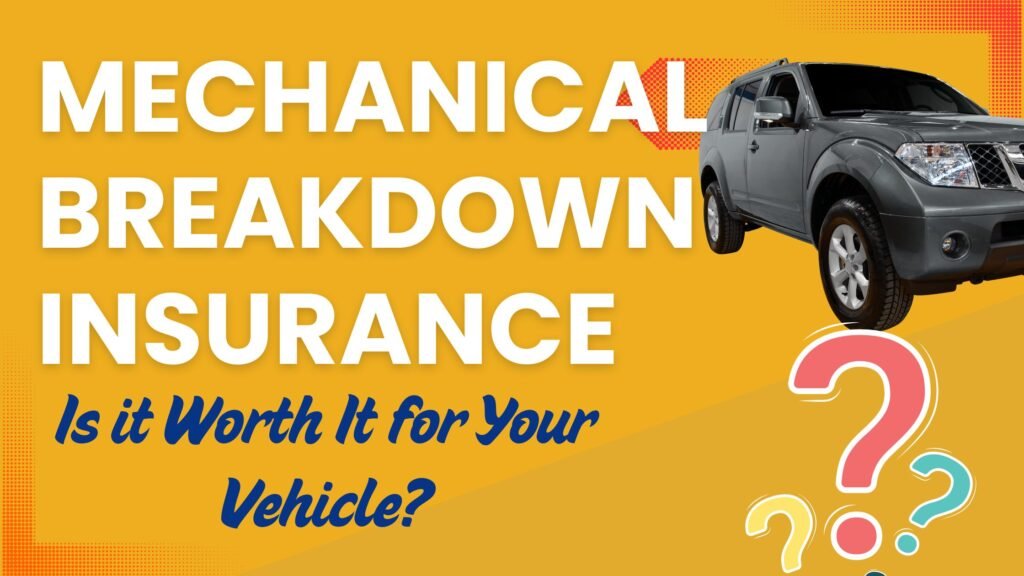Ever had your car suddenly break down, just when you thought everything was running smoothly? If you’ve experienced the stress (and costs) of unexpected car repairs, you’re not alone. That’s where something called Mechanical Breakdown Insurance (often shortened to MBI) comes into play. But what exactly is it, and is it really worth your money?
In this post, we’ll break down everything you need to know about Mechanical Breakdown Insurance in plain, simple terms. We’ll look at how it works, what it covers, who should consider it, and who probably shouldn’t. By the end of this, you’ll have a clearer idea of whether MBI is a valuable safeguard for your car or just another extra cost you don’t need.
FAQs About Mechanical Breakdown Insurance
Here are some questions and their short answers that we found are frequently asked by our readers.
Disclaimer: We are not a financial adviser; please consult one.
Answer: MBI covers repairs for mechanical failures like transmission, engine, or drivetrain issues, but excludes accidents, wear and tear, or routine maintenance like oil changes.
Answer: MBI costs around $100/month on average, varying by vehicle age, mileage, and insurer. GEICO’s MBI is cheaper, often “pennies per day.”
Answer: MBI is often cheaper and allows repair shop choice, unlike warranties requiring approved facilities, but coverage may overlap for new vehicles.
Answer: Drivers with new or low-mileage vehicles (under 15,000 miles) or those without savings for costly repairs benefit most, as MBI is unavailable for high-mileage cars.
Answer: GEICO, Mercury, and Progressive are top providers, offering affordable MBI with flexible repair options for vehicles under 7 years or 100,000 miles.
So, What Is Mechanical Breakdown Insurance?

You already know that car insurance typically covers you in the event of an accident, theft, or damage caused by weather. But what about when your engine fails or your transmission gives out, and it’s not because of a collision? That’s where MBI comes in.
Mechanical Breakdown Insurance helps you cover the costs of major repairs when certain parts of your car suddenly stop working due to mechanical failure. Think of it as a more flexible alternative to an extended warranty.
Sounds Like a Warranty, Right?
You’re not wrong. MBI does sound a lot like an extended car warranty, and they do cover many of the same things. The big difference is in who offers them and how they’re managed.
- MBI is provided by insurance companies, and it usually requires you to go through licensed repairs and claims processes specific to your insurer.
- Extended warranties are offered by car dealerships or manufacturers and may have more limitations on where you can go for repairs.
One other big difference? MBI often has fewer upfront costs, and you might even pay monthly along with your car insurance. That can be a lot easier on the wallet than shelling out a big chunk of change for an extended warranty all at once.
What Does Mechanical Breakdown Insurance Cover?
While every policy may vary a bit depending on the provider, here’s a general idea of what’s typically covered:
- Engine parts and major components
- Transmission system
- Drive axle
- Brakes (not including normal wear-and-tear items like pads or rotors)
- Electrical systems
- Steering components
- Air conditioning and heating systems
Think of it as protection for all the big-ticket systems in your vehicle, the ones that can cost thousands of dollars to repair.
What’s NOT Covered?
MBI doesn’t cover everything. Like other types of insurance, it has its limits. Here are some common exclusions:
- Regular maintenance like oil changes, filter replacement, or tire rotation
- Cosmetic damage like scratches, paint issues, or dents
- Wear-and-tear items such as wiper blades, tires, and brake pads
- Accidents – that’s what your regular auto insurance is for
In short, MBI is for those unexpected internal breakdowns, not for things that wear out over time or get damaged in a crash.
Is Mechanical Breakdown Insurance Worth the Cost?

Now, here’s the big question: Is it worth putting your money into Mechanical Breakdown Insurance?
Let’s weigh the pros and cons, and then consider whether it fits your personal situation.
Pros of MBI
- Peace of Mind: You won’t lose sleep wondering how you’ll pay for a surprise $2,500 transmission repair.
- Budget-Friendly: Spreading out your protection through monthly premiums can be easier to manage than major car repairs.
- Can Save Money: For some, one major repair could more than offset the cost of the insurance policy.
- No Out-of-Pocket Surprise Costs: Most MBI policies come with a manageable deductible.
Cons of MBI
- May Go Unused: If your car doesn’t break down, you may feel like you wasted your money.
- Not for Older Cars: Many policies only cover newer vehicles or have mileage limits.
- Limited Repair Network: You might not get to choose your mechanic unless they’re in-network.
Who Should Consider Mechanical Breakdown Insurance?
This type of insurance isn’t one-size-fits-all. Here’s a quick rundown of who might benefit most and who might want to skip it.
Consider MBI if you:
- Drive a newer or low-mileage vehicle: Many insurance companies only offer MBI for cars under a certain age (usually 10-15 years old) and with low mileage (typically under 15,000 miles).
- Want to avoid big repair bills: You’re not handy with cars and would rather pay monthly than suddenly fork out thousands.
- Plan to keep your car after the warranty expires: MBI can kick in right when your factory warranty ends, which is usually after 3 years or 36,000 miles.
You might skip MBI if you:
- Drive an older or high-mileage car: If your vehicle doesn’t qualify, MBI won’t be available to you anyway.
- Have savings for emergencies: If you’ve built a rainy-day fund for car repairs, you might not need the extra coverage.
- Your car already has a solid warranty: If you’re still covered under a manufacturer’s warranty, you may not get much out of an MBI policy.
Real-Life Example: Meet Sarah

To make it a bit more relatable, let’s consider Sarah’s story. She bought a brand-new SUV and decided to skip the dealership’s extended warranty it felt too pricey. Six months later, her A/C suddenly stopped working. With summer around the corner, she couldn’t stand the idea of driving in a sauna. The repair? Nearly $1,800.
Thankfully, Sarah had enrolled in MBI through her auto insurance provider. Her plan covered the full repair, minus a small deductible. For her, MBI more than paid for itself in the first year.
How Much Does Mechanical Breakdown Insurance Cost?
Prices vary, but most MBI policies cost between $30 and $100 per year, depending on your vehicle and coverage limits. That’s less than $10 a month in many cases. Deductibles usually range from $50 to $250 per claim.
Just remember: While it’s pretty affordable, these policies do come with limits. You may have a maximum payout cap or need to renew coverage periodically.
How to Get MBI Coverage
Interested in getting covered? Here are a few fast tips:
- Check with your current insurer. Many large companies like Progressive offer MBI as an add-on.
- Compare plans. Not all MBI coverage is created equal; some cover more parts than others.
- Read the fine print. Know what’s covered, what’s excluded, and how claims are handled.
It’s always smart to get quotes and ask questions. If a provider won’t walk you through the policy, that’s a red flag.
Final Thoughts: Is MBI Right for You?
Mechanical Breakdown Insurance isn’t for everyone, but it can be a smart choice for the right driver. If you’re driving a newer car, planning to hold onto it long-term, and don’t want to foot major repair bills out of pocket, MBI offers peace of mind at an affordable price.
But like any insurance, it’s a bit of a gamble. You may never need it, or it may save you thousands at the worst possible time.
So, ask yourself: Would I be able to handle a $2,000 repair bill tomorrow? If the answer’s no, it might just be worth giving MBI a closer look.
Looking for More Insurance Insights?
Want to learn more about car insurance basics? Check out our other helpful guides on:
- United Auto Insurance Review: Affordable Coverage, Mixed Ratings
- Rhode Island Auto Insurance Guide: Savings Tips
- Best Auto Insurance Options for Drivers in Iowa
- Kentucky Car Insurance: Rates, Laws, and Coverage Options
- Missouri Auto Insurance: Requirements & Coverage Options
- Connecticut Auto Insurance Guide for Drivers: Coverage and Requirements
- Connecticut Auto Insurance Guide: Coverage, Requirements, and Savings Tips
- Tennessee Auto Insurance Requirements and Coverage Guide for 2025
- GEICO vs Progressive: Comparing Rates, Coverage, and Customer Experience
Have you had any experience with Mechanical Breakdown Insurance,e good or bad? Drop a comment below and let’s talk about it!

